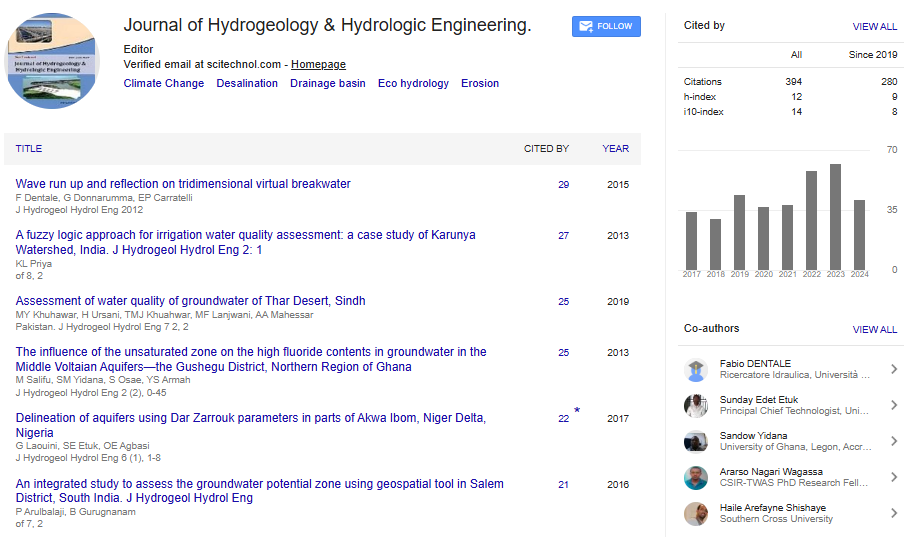Perspective, J Hydrogeol Hydrol Eng Vol: 12 Issue: 6
Earth's Hidden Waters: An In-Depth Look into Isotope Hydrology and Its Importance in Determining Global Water Dynamics
Michael Douglas*
1Department Civil and Environmental Engineering, Clemson University, Clemson, United States of America
*Corresponding Author: Michael Douglas,
Department Civil and Environmental
Engineering, Clemson University, Clemson, United States of America
E-mail: douglasm@gmail.com
Received date: 20 November, 2023, Manuscript No. JHHE-23-123087;
Editor assigned date: 22 November, 2023, PreQC No. JHHE-23-123087 (PQ);
Reviewed date: 07 December, 2023, QC No. JHHE-23-123087;
Revised date: 15 December, 2023, Manuscript No. JHHE-23-123087 (R);
Published date: 25 December, 2023, DOI: 10.4172/2325-9647.1000292
Citation: Douglas M (2023) Earth's Hidden Waters: An In-Depth Look into Isotope Hydrology and Its Importance in Determining Global Water Dynamics. J Hydrogeol Hydrol Eng 12:6.
Description
Isotope hydrology, a branch of hydrology that employs isotopic techniques to study the movement and distribution of water on Earth, has emerged as a powerful tool in unraveling the mysteries of our planet's water cycle. By analyzing the variations in stable isotopes of hydrogen and oxygen, scientists can gain valuable insights into the sources, pathways, and processes that govern the movement of water in different environmental compartments.
Understanding isotope hydrology
At its core, isotope hydrology relies on the fact that different water sources exhibit distinct isotopic signatures. The most common isotopes used in this field are deuterium (2H) and oxygen-18 (18O). These isotopes can provide information about the origin of precipitation, the dynamics of groundwater recharge, and the interactions between surface water and groundwater.
Precipitation isotopes
Stable isotopes in precipitation vary based on factors such as temperature, altitude, and meteorological conditions. By studying the isotopic composition of rainfall, researchers can trace the moisture source regions, understand atmospheric circulation patterns, and even investigate changes in climate over time. This information is essential for water resource management, especially in regions where precipitation patterns play a significant role in water availability.
Groundwater investigations
Isotope hydrology plays a pivotal role in characterizing groundwater systems. The isotopic composition of groundwater can reveal valuable information about its origin, residence time, and interactions with surface water. This knowledge is essential for sustainable groundwater management, as it helps assess the vulnerability of aquifers to contamination, estimate recharge rates, and design effective conservation strategies.
Surface water-groundwater interactions
One of the key challenges in hydrology understands the complex interactions between surface water and groundwater. Isotope hydrology provides a unique perspective by tracing the exchange of water between these two compartments. This knowledge is vital for managing water resources in river basins, preventing over-extraction of groundwater, and maintaining the ecological balance of aquatic ecosystems.
Paleoclimate reconstructions
Isotopic analysis of water stored in natural archives such as ice cores, tree rings, and lake sediments enables scientists to reconstruct past climate conditions. By examining changes in isotopic ratios over time, researchers can unveil the climatic variations that have shaped our planet. This information is invaluable for understanding the longterm trends in precipitation, temperature, and hydrological cycles.
Applications in agriculture
Isotope hydrology has practical applications in agriculture, where water management is precarious for crop production. By tracing the origin and movement of irrigation water, researchers can optimize water use efficiency, identify potential sources of contamination, and develop sustainable agricultural practices that ensure food security in the face of changing climate conditions.
Global water security
In a world facing increasing water scarcity and the impacts of climate change, isotope hydrology contributes significantly to global water security. Its applications extend to transboundary water management, helping nations share water resources equitably and sustainably. Through collaborative efforts, isotope hydrology can foster international cooperation in addressing water-related challenges.
Conclusion
Isotope hydrology stands at the forefront of modern hydrological research, offering unparalleled insights into the intricate dynamics of Earth's water cycle. As we confront growing water-related challenges, from changing precipitation patterns to the depletion of aquifers, the knowledge gained through isotope hydrology becomes ever more essential. This comprehensive exploration of isotope hydrology highlights its diverse applications, from unraveling the mysteries of past climates to guiding present-day water resource management, paving the way for a more sustainable and secures water future for our planet.
 Spanish
Spanish  Chinese
Chinese  Russian
Russian  German
German  French
French  Japanese
Japanese  Portuguese
Portuguese  Hindi
Hindi 
